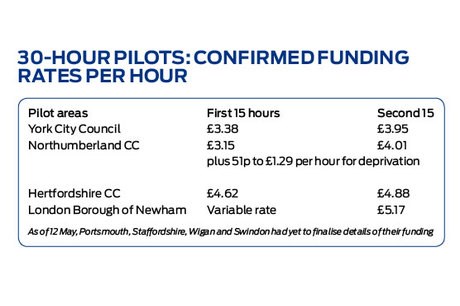Local authorities reveal details of 30-hour rates
Monday, May 16, 2016
More local authorities have confirmed details of the funding for the 30-hour childcare pilots, with the early education entitlement and the extra childcare paid at different rates.

More local authorities have confirmed details of the funding for the 30-hour childcare pilots, with the early education entitlement and the extra childcare paid at different rates.
In Northumberland, early years providers will receive the current base rate of £3.15 per hour per child for the first 15 hours, with extra funding available based on deprivation.
The rate for the extra 15 hours of childcare is £4.01, with no extra funding for deprivation.
The council is offering places initially to parents living in rural areas, and will then test the theme of flexibility by allowing eligible parents to choose any childcare provider willing to deliver the extra hours.
Those taking part in the pilot will receive the current rate for 15 hours, plus the extra rate for the extended entitlement ‘shared fairly where appropriate’, the council said.
Nursery group Kids 1st, now part of Busy Bees, is intending to take part in the pilot.
Kelly Walsh, Kids 1st senior area manager, said, ‘Parents at our nurseries welcome this extended entitlement and we are keen to prepare as much as possible for the full roll-out in 2017.’
Ms Walsh added that the pilot would run at its Hexham and Wansbeck nurseries. ‘We’re going to offer as many places as we can, around 24 at Hexham and probably about 14 at Wansbeck.’
She said the ideal model to make the funding work would be three ten-hour days, with parents paying for meals separately. The 30-hour offer would also be stretched over 52 weeks.
In the London Borough of Newham, the pilot will offer 415 places to children with special educational needs and disabilities. The council is writing to eligible parents and is in discussion with providers about how it will work.
In Hertfordshire, the pilot will take place in four small areas, with 415 places available.
A council spokesman said, ‘We have approached all early education and childcare providers in each of the four areas and have invited them to be part of the pilot. Currently we have 55 providers in the four areas of the county who are keen to be part of the pilot. We have pre-schools, day nurseries, childminders and schools who will be part of the pilot. Providers do not have to put bids in to be part of the pilot.’

Meanwhile, as Nursery World has reported, the future of the York pilot is more unclear, with more than 30 childcare providers in the city refusing to take part in the scheme at the current funding rates (see box, below).
The York pilot is viewed as crucial as it is the only one of the eight trial areas that is a local-authority-wide scheme for all eligible parents.
York City Council was due to meet with Department for Education officials on Friday (13 May) to try to resolve the standoff.
Nursery owners are also concerned that two separate rates are being offered for the pilots, which they say is likely to cause administrative problems.
Menna Godfrey, owner of Quackers Pre-school based at Copmanthorpe Primary School in York, said the two different rates were problematic where childcare is split between two or more providers. ‘Who has the lower rate, and who has the higher rate?’ she said.
Splitting the funding rates for the 30 hours also appears to be at odds with the DfE’s intention. During a debate on the Childcare Bill last year, childcare minister Sam Gyimah said providers would be paid at the same rate for offering the 30 hours.
‘Some members have asked whether the first 15 hours of provision will be different from the second 15 hours. We will pay the same rate for each,’ he said.
The Pre-school Learning Alliance said funding at two different rates was misleading and impractical.
Chief executive Neil Leitch said, ‘When the minister stated in November that the additional 15 hours would be funded at the same rate as the first, we assumed – in good faith – that this would apply during the 30-hours trial. So we were surprised to learn that early implementers would be in receipt of two separate rates.
‘Aside from being wholly impractical, funding only the additional hours at a higher rate is misleading: when you average out the whole 30 hours, the overall increase in funding is significantly less than the sector was led to believe it would be.
‘There is a real danger that, by offering two separate rates, a false dichotomy is being created between the first 15 hours of “early education” and the subsequent 15 hours of “childcare”. Our view on this is clear: anything less than 30 hours of high-quality early years provision would be a failure of the policy.’
The DfE has said that pilot rates are ‘not a reflection of the final funding rate providers will get to deliver our 30-hour offer from next September – this interim funding rate is specifically for areas that are starting to deliver our offer earlier for the additional hours.’
But Mr Leitch said this was ‘concerning’.
‘Given the pilots are meant to give providers a realistic view of how the scheme will work in practice, such a statement calls into question the value and integrity of the entire trial,’ he added.





